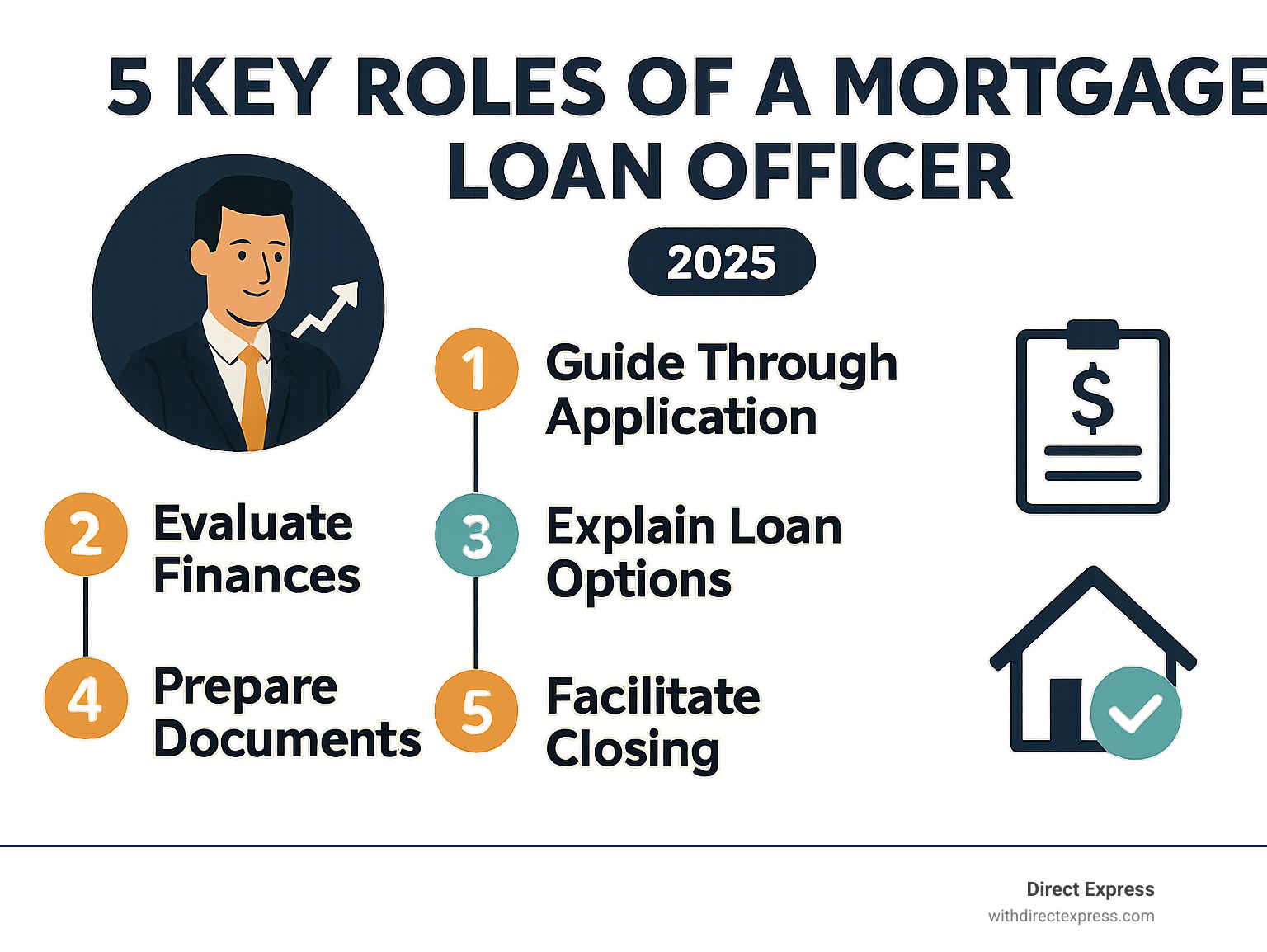Your Guide to the Home Loan Journey
Navigating the journey to homeownership requires expert guidance, and mortgage loan officers are your key partners in this crucial process. They are the professionals who help you secure the financing needed to buy your dream home.
Here’s a quick overview of what mortgage loan officers do:
- Guide you through the entire home loan application process.
- Evaluate your finances and creditworthiness to find suitable options.
- Explain different loan products and terms in simple language.
- Help prepare and submit all necessary loan documents.
- Facilitate approval and guide you smoothly to closing day.
They stand as vital allies, simplifying complex financial decisions and ensuring you understand every step.
With my background as a Loan Officer at United Liberty Mortgage, I’ve seen how mortgage loan officers empower clients to achieve their homeownership dreams. In this guide, we’ll explore their role and how they can best assist you.

What is a Mortgage Loan Officer and What Do They Do?
A mortgage loan officer is a financial expert who helps you secure financing to buy real estate. They act as your personal guide, connecting you with the financial institution funding your home purchase.
Their main goal is to help qualified borrowers get a mortgage by walking them through the application process. As trusted advisors, they work to understand your financial situation and match you with the best loan options from their institution.

A common question is the difference between a mortgage loan officer and a mortgage broker. A mortgage loan officer works for a single lender (like a bank or mortgage company) and is an expert on that institution’s loan products. In contrast, a mortgage broker works independently with multiple lenders to shop for various loan products. While both help you get a mortgage, their scope of offerings differs. At Direct Express, we connect you with the right professionals to ensure a smooth process.
Mortgage loan officers are vital to the loan process. They review your finances, check your credit, and determine which loan programs you qualify for. They also explain complex terms, interest rates, and repayment structures, ensuring you’re confident in your financial decisions.
Key Responsibilities of Mortgage Loan Officers
The duties of a mortgage loan officer are essential for a smooth home-buying experience, supporting you from your first inquiry to closing day.
Here’s a closer look at how they support you:
- Client Interview: Your loan officer will interview you to understand your homeownership goals, income, expenses, and overall financial health. This initial conversation helps them gather the necessary details to provide custom advice.
- Financial Data and Document Preparation: They will help you gather necessary documents like pay stubs, tax returns, and bank statements. The loan officer then assists in accurately completing all loan paperwork to avoid delays.
- Creditworthiness Evaluation: A key part of their job is analyzing your financial status and credit history to determine your eligibility for various loan options, based on current lending guidelines.
- Loan Submission: After preparing and reviewing your application, they submit it to the lender’s underwriting department, sometimes advocating on your behalf for approval.
- Explaining Loan Products: A crucial role is to break down complex loan types (like fixed-rate, adjustable-rate, FHA, VA, and conventional loans) in simple terms. They clarify interest rates, terms, and fees so you can make an informed choice.
- Collaboration with Underwriters: The loan officer acts as a bridge between you and the underwriters, who make the final loan decision. They provide any additional information needed to keep your application moving forward.
These responsibilities show how valuable a dedicated mortgage loan officer is. They handle the complex parts of lending, so you can focus on finding your perfect home. For more information about buying real estate, we encourage you to visit our dedicated page: More info about buying real estate.
The Path to Becoming a Licensed Mortgage Loan Officer
Becoming a mortgage loan officer is a fulfilling career that requires specific education, skills, and licensing. Understanding this path helps you appreciate the expertise they bring when guiding you through one of life’s most significant financial decisions.
Education, Skills, and Personal Qualities
Most mortgage loan officers hold a bachelor’s degree, often in finance or business. This background provides a solid foundation in financial principles, helping them steer the complex world of lending. Beyond education, successful officers possess a blend of technical and personal skills:
- Interpersonal Skills: They must be excellent communicators with empathy, able to explain complex financial concepts simply and understand the client’s perspective.
- Analytical Skills and Attention to Detail: These are crucial for accurately reviewing financial documents and assessing creditworthiness.
- Integrity and Dependability: High integrity is critical, as clients entrust them with sensitive financial information.
- Sales and Self-Motivation: The role has a sales component, requiring self-motivation to build referral networks and find new clients.
- Problem-Solving: Strong problem-solving skills are needed to handle unexpected issues, like credit report problems or low appraisals.
- Tech-Savviness: Comfort with technology, including loan origination software and digital communication tools, is essential in modern lending.
For a deeper dive into the general qualities and skills of loan officers, you can explore O*NET’s profile on Loan Officers.
How to Get Your MLO License
The licensing process through the NMLS (Nationwide Multistate Licensing System) is a thorough procedure designed to protect consumers. The key steps include:
- Eligibility: Candidates must be at least 18 and pass background and credit checks.
- Education: Complete at least 20 hours of NMLS-approved pre-licensing courses.
- Exam: Pass the NMLS National Exam, which covers federal law, ethics, and lending principles.
- Authorization: Submit fingerprints for an FBI background check and authorize a credit report review.
- Licensing/Registration: Obtain state licensing or federal registration, depending on the employer (e.g., independent mortgage company vs. bank).
- Continuing Education: Maintain the license with annual continuing education (typically 8 hours) to stay current on laws and best practices.
This rigorous process ensures that when you work with a licensed mortgage loan officer, you’re working with a qualified professional. To check your specific state licensing agency requirements, visit Check your state licensing agency requirements.
The Working World of Mortgage Loan Officers
The daily life of a mortgage loan officer is dynamic, shaped by market conditions, technology, and the need to connect with clients.
How are Mortgage Loan Officers Compensated?
Compensation for mortgage loan officers varies by experience, location, and performance, with a median annual wage around $74,180 as of May 2024. Most are compensated based on results, typically through a commission for each closed loan. Structures can include a steady salary (common at banks), a fixed amount per loan, or a fixed percentage of the loan amount. Many packages are a hybrid of salary and commission.
Federal regulations prohibit compensation based on loan terms, meaning an officer cannot earn more by steering you into a higher-interest-rate loan. This protection ensures they focus on your best interests.
Typical Work Environment and Schedule
Mortgage loan officers typically work in professional offices at banks, credit unions, or mortgage companies. The job involves constant interaction with clients and other professionals through meetings, calls, and emails. Most work full-time, often exceeding 40 hours per week to accommodate client schedules, including evenings and weekends.
A typical day includes client meetings, document management, financial analysis, and communication with all parties in a transaction. Many also spend time on marketing and networking.
Job Outlook and Influencing Factors
The job outlook for the 334,100 mortgage loan officers (as of 2023) is tied to the housing market. The Bureau of Labor Statistics projects 1% employment growth from 2023 to 2033. However, about 22,900 openings are projected annually, mainly from professionals retiring or changing careers.
Key factors influencing demand include:
- Interest rates: Lower rates increase demand for home purchases and refinancing.
- Housing market health: A strong market with high sales volume drives demand.
- Technology: Automation handles routine tasks, allowing officers to focus on client relationships and complex problem-solving.
- Economic health: A strong economy boosts consumer confidence and home buying.
For detailed statistics, the BLS provides comprehensive information: BLS Occupational Outlook for Loan Officers.
How to Find and Choose the Right Professional for Your Needs
Finding the right mortgage loan officer is a critical step. You need a skilled, trustworthy partner who understands your goals. The process requires research, but we’re here to help.
Start by asking for referrals from your real estate agent, friends, or family. You can also check with your bank or search online. When vetting candidates, pay close attention to their communication style, experience, and willingness to share knowledge.
What to Look for in Top Mortgage Loan Officers
When you’re looking for a mortgage loan officer, you’re seeking a trusted advisor. Here’s what we recommend you look for:
- In-depth Knowledge: They should be experts on the loan process, regulations, and various mortgage products (FHA, VA, Conventional, etc.), explaining how each fits your situation.
- Loan Product Variety: They should be transparent about their lender’s product offerings and help you determine if they are the best match for your needs.
- Strong Communication: Look for a responsive and proactive communicator who can explain complex terms simply and keep you updated throughout the process.
- Problem-Solving Mindset: A great loan officer anticipates challenges and finds creative solutions to keep your loan moving forward.
- Positive Client Testimonials: A history of satisfied clients is a strong indicator of excellent service and reliability.
- Local Market Expertise: An officer with local knowledge can offer valuable insights into appraisals and property values in markets like St. Petersburg, Tampa Bay, and the surrounding Florida communities.
For those interested in investment opportunities in real estate, understanding the financial landscape is equally crucial: More info about investment opportunities.
The Advantage of Integrated Real Estate Services
At Direct Express, we know buying a home is more than just getting a mortgage. That’s why we offer integrated real estate services—including mortgage, realty, construction, and property management—all under one roof.
Our integrated model provides a streamlined process. With a single point of contact and a cohesive team, you get a smoother, less stressful journey from house hunting to closing and beyond.
Our mortgage loan officers collaborate seamlessly with our in-house real estate agents, construction, and plumbing services teams. This team collaboration ensures your home search aligns with your budget and your loan moves quickly after you find a property.
This integration is invaluable. If an inspection reveals an issue, our in-house experts can assess it. If you’re building or renovating, our construction and mortgage teams work together from day one. For investors, our property management team coordinates with your loan officer to ensure your investment is financially sound. This unified strategy is especially beneficial in dynamic Florida markets like Tampa Bay, St. Petersburg, and Parrish. For more information about building projects, visit: More info about building projects.
Frequently Asked Questions about Working with an MLO
Navigating home loans can bring up many questions. Here are some common ones to give you clarity and confidence.
What is the main role of a mortgage loan officer?
A mortgage loan officer’s main role is to guide you through the financing process to secure a loan for your home. Working for a specific lender, they are experts on that institution’s products. They evaluate your financial situation, explain your loan options, recommend the best fit, and guide you through the paperwork from application to closing.
How much does it cost to use a mortgage loan officer?
You typically don’t pay a mortgage loan officer a direct, upfront fee. Their compensation is part of the loan’s closing costs, usually a commission paid by the lender. Federal law requires this commission to be based on the loan amount, not the interest rate. This protects you by ensuring the officer is focused on finding the best loan for your needs, not the one that pays them more.
Why should I use a mortgage loan officer instead of just going to my bank?
While your bank can offer a mortgage, a dedicated mortgage loan officer provides specialized expertise. They focus exclusively on mortgages, giving them a deeper understanding of various loan programs and lending criteria than a general bank employee. They offer personalized guidance, act as your advocate, and are skilled at troubleshooting complex situations. This specialized focus can lead to a smoother, more efficient, and often more beneficial financing outcome.
Conclusion: Partnering for Your Homeownership Goals
Mortgage loan officers are essential financial partners who simplify the path to homeownership. They offer expert guidance, turning a confusing process into a manageable journey. Your loan officer acts as a translator and advocate, explaining complex terms in simple language and finding solutions that fit your unique financial goals.
At Direct Express, our integrated approach makes the difference. Your mortgage loan officer collaborates closely with our in-house real estate, construction, and property management experts. This teamwork creates a seamless, less confusing, and smoother experience for you.
This collaboration means your real estate agent is in sync with your loan officer’s timeline. Our construction team can coordinate with your loan officer on renovation financing, and our property management team can help structure your investment property loan. It’s a support system designed to ensure everyone on your team is aligned with your goals, eliminating the stress of coordinating multiple companies.
Ready to experience the difference that true partnership can make in your homeownership journey? We’re here to guide you every step of the way, from that first conversation about your goals to the day you get those keys in your hand. Explore our Mortgage Services and find how our team can help turn your homeownership dreams into reality.











